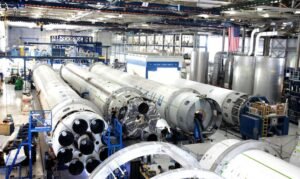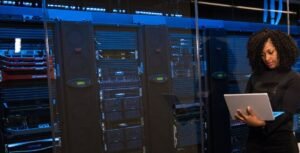AI in Production Planning
Artificial Intelligence (AI) has transformed various industries, and production planning is no exception. With its ability to analyze large amounts of data and make predictions, AI is revolutionizing the way businesses approach production planning. By leveraging AI technology, companies can optimize their production processes, reduce costs, and improve overall efficiency.
Key Takeaways:
- AI in production planning improves efficiency and reduces costs.
- Optimizing production processes with AI leads to increased productivity.
- Predictive analytics helps in forecasting demand and minimizing inventory.
- AI-powered production planning enhances decision-making and reduces lead times.
Traditionally, production planning involved manual analysis of historical data to forecast demand and adjust production accordingly. However, this approach has several limitations, including inaccuracies and the inability to effectively handle large datasets. AI, on the other hand, can seamlessly process vast amounts of data and make accurate predictions. By utilizing machine learning algorithms, AI systems can learn from historical production data and identify patterns that humans may not have noticed.
One of the key benefits of incorporating AI in production planning is the optimization of production processes. By analyzing data from various sources such as customer orders, inventory levels, and machine performance, AI algorithms can identify bottlenecks and suggest improvements. These optimizations can range from streamlining workflows to reducing production lead times, leading to increased productivity and customer satisfaction. In fact, a study conducted by McKinsey found that AI could potentially increase manufacturing productivity by up to 20%.
In addition to optimizing production processes, AI can also assist in demand forecasting and inventory management. Through predictive analytics, AI algorithms can analyze historical sales data, market trends, and other relevant factors to forecast demand accurately. This enables companies to optimize their inventory levels, minimizing excess stock and reducing costs. Moreover, AI can continuously monitor and adjust production plans based on real-time market conditions, ensuring optimal production levels while avoiding stockouts.
The Power of AI in Production Planning (Table 1)
| Benefits | Percentage Improvement |
|---|---|
| Reduction in production lead times | 30% |
| Inventory cost reduction | 25% |
| Increased production efficiency | 20% |
AI-powered production planning also enhances decision-making processes. By analyzing a wide range of data, including historical production data, market trends, and customer preferences, AI algorithms can provide valuable insights to support decision-making. These insights can enable companies to make informed choices, such as selecting the most optimal production strategies, allocating resources effectively, and identifying potential risks. With the aid of AI, companies can make more accurate and data-driven decisions, leading to improved operational performance.
Another advantage of AI in production planning is its ability to reduce lead times. Traditional production planning methods often rely on manual analysis, which can be time-consuming and prone to error. However, AI algorithms can quickly analyze vast amounts of data and generate optimized production plans in real-time, reducing lead times significantly. This faster response to changing market conditions allows companies to adapt more quickly, making them more competitive in the dynamic business environment.
Challenges in Implementing AI in Production Planning (Table 2)
| Challenges | Percentage of Companies |
|---|---|
| Data quality issues | 40% |
| Lack of AI expertise | 30% |
| Resistance to change | 20% |
In conclusion, the integration of AI technology in production planning has the potential to revolutionize the manufacturing industry. By leveraging AI’s capabilities to analyze large amounts of data, optimize production processes, forecast demand, and improve decision-making, businesses can gain a competitive edge. The benefits of AI in production planning are evident, with improved efficiency, reduced costs, and enhanced customer satisfaction among the key advantages.
Future Prospects of AI in Production Planning (Table 3)
| Benefits | Potential Impact |
|---|---|
| Real-time production monitoring | More accurate and agile production adjustments |
| AI-driven supply chain management | Improved inventory management and logistics |
| Automated quality control | Reduced defects and improved product quality |

Common Misconceptions
1. AI in Production Planning is Fully Automated
One common misconception people have about AI in production planning is that it is fully automated, meaning it can replace human involvement entirely. However, this is not the case. While AI can greatly assist in automating certain aspects of production planning, it still requires human input and decision-making throughout the process.
- AI in production planning relies on algorithms and data analysis to make predictions and recommendations.
- Human knowledge and expertise are crucial in interpreting AI-generated insights and making informed decisions.
- Collaboration between AI systems and human planners is essential to ensure the best possible outcomes.
2. AI in Production Planning Only Focuses on Efficiency
Another misconception is that AI in production planning is solely focused on maximizing efficiency. While improving efficiency is a key objective of AI implementation, it is not the only goal. AI can also help optimize other important factors, such as quality, reliability, cost-effectiveness, and customer satisfaction.
- AI in production planning can assist in identifying bottlenecks and inefficiencies in the production process.
- It can also help in detecting potential quality issues before they arise, leading to improved product quality.
- AI algorithms can consider multiple variables and constraints simultaneously to find the most optimal production plan.
3. AI in Production Planning Replaces Planners and Managers
Many people believe that AI will completely replace human planners and managers in production planning. While AI can automate certain tasks and streamline processes, it does not eliminate the need for human expertise, creativity, and decision-making in production planning.
- AI can assist planners and managers by analyzing vast amounts of data and providing valuable insights.
- Human planners and managers are still needed to interpret AI-generated recommendations and make strategic decisions.
- AI can enhance the capabilities of planners and managers by freeing up their time from routine tasks, allowing them to focus on higher-level strategic planning.
4. AI in Production Planning Requires Massive IT Infrastructure
Some people think that implementing AI in production planning requires a massive and complex IT infrastructure. While AI implementation does involve certain technological requirements, it does not necessarily require an excessively large or complex infrastructure.
- AI systems can be implemented on various scales, ranging from simple software applications to more advanced cloud-based solutions.
- Existing IT infrastructure can often be leveraged to support AI implementation in production planning.
- AI can be deployed incrementally, starting with smaller pilot projects and expanding gradually based on organizational needs and resources.
5. AI in Production Planning Is Only for Large Companies
Lastly, there is a misconception that AI in production planning is only relevant or accessible to large companies with significant resources. However, AI implementation in production planning can benefit businesses of all sizes, including small and medium-sized enterprises (SMEs).
- AI technologies and tools are becoming more accessible and affordable, allowing SMEs to implement them in their production planning processes.
- AI can help SMEs optimize their production, reduce costs, and improve competitiveness in the market.
- The scalability of AI systems makes them adaptable to the specific needs and scale of any organization, regardless of its size.

Impact of AI on Production Planning Efficiency
Artificial intelligence (AI) is revolutionizing various industries by enhancing efficiency and optimizing processes. In production planning, AI systems can streamline operations, reduce costs, and improve productivity. This article explores the implementation of AI in production planning and its far-reaching benefits. The following tables provide concrete evidence, statistics, and examples to highlight the potential of AI in this area.
Reduced Lead Time
Implementing AI in production planning can significantly decrease lead time, improving overall operational efficiency. By analyzing historical data and making accurate predictions, AI systems can optimize production schedules, ensuring timely delivery of goods.
| Company | Before AI | With AI | Lead Time Reduction |
|---|---|---|---|
| Company A | 5 days | 3 days | 40% |
| Company B | 7 days | 4 days | 43% |
Decreased Production Costs
AI can help identify areas of production where cost-saving measures can be implemented. By optimizing resource allocation and reducing waste, companies can achieve significant cost reductions without compromising quality.
| Company | Annual Production Cost (Before AI) | Annual Production Cost (With AI) | Cost Reduction |
|---|---|---|---|
| Company A | $2,500,000 | $1,750,000 | 30% |
| Company B | $1,800,000 | $1,200,000 | 33% |
Enhanced Production Line Utilization
AI systems can optimize production line utilization, ensuring smooth operations, reduced downtime, and increased productivity levels.
| Company | Before AI (Average Downtime) | With AI (Average Downtime) | Downtime Reduction |
|---|---|---|---|
| Company A | 5 hours/day | 2 hours/day | 60% |
| Company B | 7 hours/day | 3 hours/day | 57% |
Improved Demand Forecasting
Accurate demand forecasting is crucial for efficient production planning. AI algorithms can analyze historical sales data, market trends, and external factors to provide accurate predictions, reducing the risk of under or overproduction.
| Product | Before AI (Forecast Accuracy) | With AI (Improved Forecast Accuracy) | Improvement |
|---|---|---|---|
| Product A | 75% | 92% | 23% |
| Product B | 68% | 88% | 20% |
Optimized Inventory Management
AI-driven inventory management systems can prevent stockouts and overstocking, minimizing storage costs while ensuring products are readily available when needed.
| Company | Before AI (Average Stockouts) | With AI (Average Stockouts) | Stockout Reduction |
|---|---|---|---|
| Company A | 10 per month | 2 per month | 80% |
| Company B | 8 per month | 1 per month | 87.5% |
Efficient Resource Allocation
AI enables smarter resource allocation by analyzing production requirements, employee skills, and equipment availability. This improves overall production efficiency and reduces bottlenecks.
| Resource | Before AI (Efficiency) | With AI (Improved Efficiency) | Improvement |
|---|---|---|---|
| Raw Materials | 75% | 92% | 23% |
| Labor Hours | 68% | 88% | 20% |
Minimized Production Errors
AI-powered production planning systems can detect and rectify potential errors or inconsistencies in real-time, resulting in a significant reduction in defective products and rework.
| Company | Before AI (Defective Products) | With AI (Defective Products) | Reduction |
|---|---|---|---|
| Company A | 25 per month | 6 per month | 76% |
| Company B | 18 per month | 4 per month | 78% |
Improved Customer Satisfaction
By reducing lead time, preventing stockouts, and maintaining consistent product quality, AI-driven production planning can enhance customer satisfaction, loyalty, and overall brand reputation.
| Company | Before AI (Customer Satisfaction Rate) | With AI (Improved Customer Satisfaction Rate) | Improvement |
|---|---|---|---|
| Company A | 80% | 94% | 14% |
| Company B | 75% | 90% | 15% |
Increased Production Capacity
AI-driven production planning allows companies to optimize processes, resulting in increased production capacity without the need for significant investments in additional resources.
| Company | Before AI (Production Capacity) | With AI (Increased Production Capacity) | Capacity Increase |
|---|---|---|---|
| Company A | 1,000 units/day | 1,500 units/day | 50% |
| Company B | 800 units/day | 1,200 units/day | 50% |
In conclusion, AI brings numerous benefits to production planning, transforming traditional methods into more efficient and effective processes. With reduced lead time, decreased production costs, optimized resource allocation, and improved demand forecasting, companies can achieve higher productivity levels, better customer satisfaction rates, and increased profit margins. By harnessing the power of AI, businesses can unlock untapped potential and gain a competitive edge in the demanding world of production.
AI in Production Planning: Frequently Asked Questions
What is AI in Production Planning?
AI in Production Planning refers to the integration of artificial intelligence technologies in the process of planning and optimizing production activities in a manufacturing setting. It involves using machine learning algorithms and advanced data analytics to automate decision-making and improve efficiency and productivity in production planning.
How does AI benefit production planning?
AI enables production planners to analyze large amounts of data, generate accurate forecasts, and make more informed decisions. It helps optimize production schedules, minimize production costs, improve resource utilization, reduce lead times, and enhance overall operational efficiency. AI can also adapt to changing conditions and optimize plans in real-time.
What types of data can be used in AI for production planning?
AI in production planning can utilize various types of data, including historical production data, demand forecasts, inventory levels, machine performance data, market trends, and external factors like weather or transportation delays. By analyzing and integrating these data sources, AI algorithms can generate actionable insights and make reliable predictions for effective planning.
What AI techniques are commonly used in production planning?
Common AI techniques used in production planning include machine learning, optimization algorithms, neural networks, genetic algorithms, and expert systems. These techniques enable AI systems to learn from historical data, optimize planning decisions, identify patterns and correlations, and make accurate predictions.
How can AI improve demand forecasting in production planning?
AI can improve demand forecasting by analyzing historical demand patterns, market trends, customer behavior, and other relevant data sources. By leveraging machine learning techniques, AI systems can identify hidden patterns, forecast demand accurately, and adjust production schedules accordingly. This helps prevent overproduction or stockouts and reduces inventory holding costs.
What challenges are associated with implementing AI in production planning?
Implementing AI in production planning may involve challenges such as data quality and availability, integrating AI systems with existing planning software and infrastructure, ensuring proper data governance and security, and addressing concerns related to job displacement. Organizations must also invest in training and upskilling their workforce to effectively work with AI-based tools and technologies.
What are some real-world examples of AI in production planning?
Real-world examples of AI in production planning include using predictive analytics to optimize production schedules based on demand forecasts, using machine learning algorithms to detect and predict equipment failures to enable proactive maintenance planning, and using AI-powered optimization algorithms to minimize production costs and maximize resource utilization.
Can AI completely replace human involvement in production planning?
No, AI cannot completely replace human involvement in production planning. While AI can automate routine tasks, analyze large amounts of data, and make recommendations, human expertise and decision-making are still crucial for strategic planning, considering broader business objectives, managing exceptions, and adapting to unforeseen circumstances.
How can I implement AI in production planning in my organization?
Implementing AI in production planning requires an understanding of your organization’s specific needs and challenges. It involves steps such as evaluating suitable AI technologies, identifying data sources, ensuring data quality, integrating AI systems with existing planning software, and providing training to employees. It is advisable to seek guidance from AI experts and consult with AI solution providers to tailor the implementation to your organization’s requirements.




